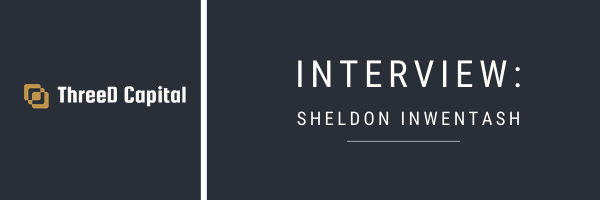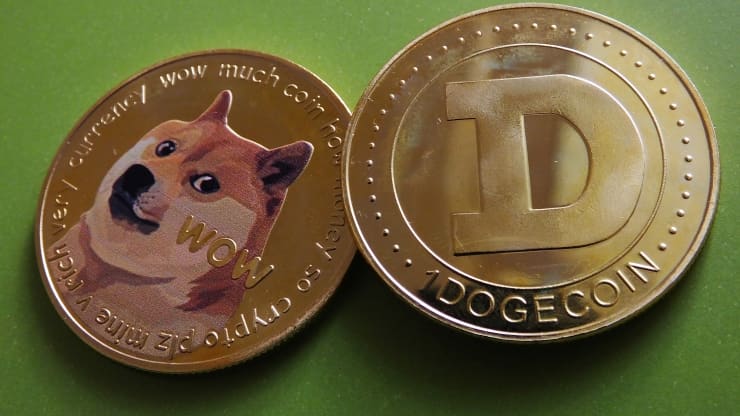Today’s interview is between Michael Gord, CEO of GDA Capital, and Sheldon Inwentash, founder and CEO of ThreeD Capital.
Mike is the CEO of GDA group of companies and previously the founder of MLG Blockchain, which was Canada’s largest and one of North America’s largest blockchain companies. He’s first-hand been involved in over $500 million of digital asset raises. Additionally, he’s helped capitalize over $5 billion of assets for digital asset companies, amongst some other notable achievements in traditional markets where he’s helped with M&A and emerging technology.


They’ll be discussing traditional investing and the future. Taking a small shift from old asset investments, we’re going to be looking further into how traditional investment strategies are changing, and how they’re going to look in the future and Sheldon’s perspectives on the subject.
This interview was conducted at the Global Family Office Summit on October 20th, 2020. The summit is run by GDA Capital and featured many interesting guests that we’ll be featuring in future interviews.
Mike: So for this conversation, we’re going to start by going back a bit and get some perspective on Sheldon’s career, where he came from, and how he got to where he’s at now. We’re going to reflect on things that investors can do considering the current economic climate with COVID and everything that’s happening in the world. And then we’re going to take some time to consider where the future is going to be with disruptive technology and where the world is going.
So thank you, Sheldon, for joining us. Maybe we could start with you providing some context into your background and how you got to where you are.
Sheldon: Sure. Thank you, Michael. And, you know, thanks for bringing me on to this forum. It’s been a very informative morning listening to international perspectives.
I’ve been around long enough that I’ve got lots of battle scars. The only way I can say it is I’m a hybrid. If I sort of had to relate myself with everybody here on the phone call today, I guess I would say I’ve held almost every hat. ThreeD Capital, which is public, and the only reason I believe in public is that it functions like a family office, but with some public shareholders that have followed me for a long time. They want to participate, but if they want to exit, I don’t want to stop that exit and make it a formal exit and an expensive exit. So people sometimes get on the bus and get off the bus depending on how they feel about my views and the world.
And so listen, I’m different than many people in the creative world and the creative arts. I’m actually a CPA and also a very significant collector of contemporary art because I believe that fits into my thinking of the world.
I spent some time at Pricewaterhouse. I did my minimum duty of three years. I became an oil and gas analyst at a major life insurance company then I bought a big money manager for a life insurance company out of Toronto.
So, I’ve always had a predisposition for early stage creation where things are disruptive and can make a difference to the world. And I go back to the 80’s. I’ve lived in a few of these different decades and the evolution of it.
The way I think is, I always go top down, and I always have to. I create my own vision of the world and then I basically go micro depending on how I view that vision. And typically, today my style is that I’m a lead investor in a project but I’m also an advisor and a strategic driver. So, it’s a quasi-hybrid venture capital role where you influence companies, but I do so as not the hammer over their heads, but instead letting good people do what they have to do. I try to give the benefit of the experience.
I’ve personally been involved in over $20 billion of raising of capital for my own ventures, so when I get behind something, capital is absolutely the least important thing to do and to achieve.
So, you know, I guess I’m just gonna go back 20 years. I can talk about how I founded a nuclear medicine business, I co-founded the first pharmacogenomics company. I’m the financial guy. So, these are biotech deals – one in nuclear medicine and the other one is pharmacogenomics, which today is basically… the precursor of what is today personalized medicine. I’m a big believer in biotech, but it’s a tough one because typically, as everybody knows, you’ve got to pay to answer the question, “does it work?” Do your trials work? And then you’ve got to go through the FDA.
So, I’m involved in this space today. I have a very close friend who’s also a CA and founded a bunch of funds. His name is Eric Sprott out of Toronto, we both agreed in 2001 that we were coming to the end of an era. It was the beginning of the Internet which is no question the platform for everything we see today. But also, with both of us being accountants and looking at the US balance sheet – maybe it was $15 trillion then, $12 trillion, I’m not sure – basically countries were spending money poorly. Money was being spent not in our best interests but in the interests of those who managed that money for their own personal or optic gain, and maybe some cases more than that. So much capital has been wasted in the world and the taxpayers and all of us are suffering because of that.
I basically collaborated a lot with Eric on the alternative to these vast balance sheets or vast debts on their balance sheet that are impossible to be repaid. The US dollar is the US brand of currencies, so therefore everybody has to be in it. And that hasn’t changed until today. I mean, you’ve got the RMB which is breaking out against the US dollar in some ways. It’s not very transparent, but definitely has the ambition to be that world currency. The euro, I just don’t think makes any sense because I don’t believe you can’t have different cultures and different economies form into one currency. It’s too political.
So, the alternative I came up with was gold. I’ve had about six exits on gold – three of them over a billion dollars, others pretty high. I was extremely active when I had Pinetree Capital in the resource space. And why I was there is because it was hard assets and against the US dollar. But a big problem back then in the 2000-2010 range was the manipulation by Morgan Stanley of the gold market. That really knocked out a lot of the believers who don’t have the staying power when you have banks basically controlling it. Because the gold market is actually an extremely small market when you look at it, and the central banks were dumping. It could not be a material central bank currency.
Well, so, I’ve always had as part of my DNA thinking that I have to be in assets that are against the US dollar. Therefore, it was gold. And over a long period of time, that has evolved into blockchain. Obviously, the word cryptocurrency is misused. And I believe that, for the same reasons gold has had its substantial renaissance, so will blockchain.
Now, Bitcoin is the brand. I don’t view Bitcoin personally as very attractive. I think it’s like gold. It’s a brand. But I do believe through blockchain there are gonna be thousands of digital alternatives to currency that are gonna play roles in supply chains, in peer-to-peer transactions, and so forth. That will allow for more control over everything that we know that blockchain allows one to control (i.e. identity, encryption, security, etc.). But also decentralization away from banks. So, I’m a big believer.
Now, what’s happened that has changed things to put everything more on steroids has been COVID. And COVID has resulted in, in my view, a foolish lockdown of these economies. I was against it, I still am. And it happened because the world panicked on a disease they didn’t understand and know. And I know enough about the derivation of these diseases in China, which basically started off by poor peasant farmers putting pigs and chickens together and that created these anomalies and permutations. Rogue mutations into diseases that there was no cure or vaccine for. There’s a whole history of them.
There will be many more COVIDs, but what COVID did is it freaked everybody out and shut these economies down. The stimulation to the balance sheet – and let’s just talk about America – where $3 or 4 trillion dollars has totally blown open. The whole concept of the devaluation that’s real now in the US dollar. But devaluation against what? And this has always been the big issue, as I mentioned earlier.
So, you have the RMB which is gonna gain strength without question because the Chinese economy is rebounding and, you know, basically the way that they run their country is centralized. I think they will become the masters of international commerce. I see it in Africa. I’m very involved in Africa in the minerals game.
I believe that COVID has been the catalyst for acceleration in alternative currencies and alternative assets. In addition, this has created or exacerbated what was already the beginning of the digital revolution. And obviously it started with the Internet because without that, nothing could happen. Then broadband, high-speed, and all the things that make it easier, user-friendly, and so forth.
Through the digital revolution what have we found? That when the stock market bottomed and Bill Ackman was able to hit it dead on when shortly after that the stock market made a new high. And people are going, ‘how is that?’ How is there this lack of attachment between the stock market and the economy in the street where you want to go to your local restaurant and all these businesses? Well, what’s lost on one hand is gained on the other hand. You can look at Zoom and Netflix and so forth.
And so this has been the most productive year of my life because I’m focused. I don’t have to get on planes every other week and have poor eating habits. There’s nothing wrong with spending maybe a bit of quality time with your family. But all that being separate, I believe that this whole digital revolution evolution is going to spawn the new age of companies. Everything is an app today. Uber – it’s an app. Airbnb – it’s an app.
We’re involved in a company called Peak Positioning which is an app in China that matches lenders and people that need money. Well, you can’t borrow money today from financial institutions unless you have money. If you have a term deposit, they’ll gladly allow you to borrow against it. But if you want a mortgage, it’s very difficult even for the average person’s salary because banks don’t lend anymore.
So, who lends? Private market credit unions, B banks, and some of the bigger banks. Peak Positioning just announced a massive contract today, and they’re in China to start with, and it’s a platform technology.
Another area that’s just totally exploding that people don’t understand or misunderstand is eSports. And eSports, if you look at that vertical compared to every other sport in the world – think NFL or world soccer – is the biggest next to it. It dwarfs it by multiples. So, one of the companies I got behind is this company called eSports International. Good name. It’s actually got the stock symbol “Gamble.” And they are peer-to-peer gambling. People can bet on anything in between themselves around sports and around other things. They just announced a deal with the Los Angeles Kings.
All these bricks and mortar businesses, whether you’re a retailer – whether you are a sports team – the focus is away from that and has to be for survival first. They will realize they have brands that can be exploited big time through this whole massive digital revolution that’s occurring.
So, part of my view that depreciations over currencies are akin to inflation. I’m not a big fan of real estate but I’m a fan of raw land. Because anything I believe that has debt against it is gonna get hurt. And obviously, if you’re in the retail, storefront, or office building business, everything is gonna change. So, to me, real estate? No.
Oil and gas? We are also extremely involved in disruptive companies that feed into the electric vehicle sector and green world. And without question, that’s happening. It won’t stop and it’s growth. So why would you fight something that is yesterday’s news?
These traditional bricks and mortar businesses, some are gonna have a renaissance for different reasons. But you look at a company like Bed, Bath, and Beyond. I thought that was bankrupt three years ago – next thing you know, I’m watching CNBC and the stock doubled in a day, all online. And with COVID now, we’ve been trying to get a puppy and we can’t get that puppy across the border and we find out now that one third of Americans want pets.
All these things that are changing that I believe are affecting our lives and our investment habits. I believe the bottom line at the end of it is that digital currencies will reign supreme. But caveat emptor. There’s gonna be a lot of stuff out there. Governments are sticking their noses in and they don’t understand it… so they want to stop it. But then they’ll figure out that you can’t beat it – you’re gonna have to join it.
Central banks were selling gold. Now central banks are starting to put it back into their reserve portfolio. And I know a couple central banks that are putting Bitcoin into their central bank portfolio. It’s because it’s the only digital currency that has a brand that sort of has some history. But I believe that the real digital protocols of the future are going to have real value proposition. You’re not just gonna go, ‘oh, I’m buying something digital because I don’t want to have it in cash.’ But on the other hand, that digital may have zero utility, and if it doesn’t have any utility, in my view, it isn’t a real business. Or it’s not a real asset, I should say.
So, I think there’s gonna be less blood on the street percentage-wise than the last 2017 wakeup call on digital currencies and getting everybody to look at them seriously, but I believe that it will be a big part of our future.
I’ve rambled on here just because the way I look at things, I have to go macro and then go micro. I hope I’ve articulated some of the things people are interested in hearing about, but I’m gonna pass it back on to you.
Mike: Yeah, that was great context, Sheldon. A lot to unpack, and we don’t have too much time, but it would be great to dive a bit deeper into your career. So, you had a very successful career with traditional asset classes like gold and commodities. And then art in last maybe five or so years. But now you’ve shifted your focus to disruptive technologies, and in the last five or so years, you’ve had a huge focus on blockchain technology. Was it a conscious shift that you started to focus more on disruptive technologies? Or you did start to see the curves happening faster? Or what made you choose to shift from more traditional asset classes to the disruptive lens that you currently have?
Sheldon: Well, actually, it’s always been in my DNA. I’ve been doing disruptive technologies since 1982 when I did the first online pricing through Wi-Fi in the store environment. I also started one of the first 3D software companies in 1992. It was too early because we had to have big silicon graphics boxes and there was no high-speed. There were a lot of barriers to really doing disruptive technologies in the pre-2000s before the enabling of this became different.
It’s always been part of my DNA but I hit my head against the wall not really understanding that you can’t live in a vacuum and the macro infrastructure around you has to be there to ensure that there’s a platform for you to succeed.
Now, let me just do a caveat here. I collect art because I enjoy it. But I would say that rate of return-wise, it’s the best thing I’ve ever done just because I have a good eye and understand it and have one of the world’s best advisors. But it’s my passion. It’s really more passion. But for clarity’s sake, I don’t trade art. I just pretty well buy it. It’s something I enjoy, but I also believe that you’re gonna see art, the art market and prices for quality art, go through many ceilings. It’s gonna be priceless.
Now, as it comes to hard assets in the mineral side, I am massively bullish. I am quite deeply involved in Africa for certain metals and minerals, but I really used to be around the world much more. Less so now, but without question, I’m one of the believers that gold is going to the moon because there’s no debt against it. And that the silver/gold ratio is gonna alter so that silver is gonna actually have a catch-up value because it also has a huge technology input value.
So, as with blockchain, you can’t just do blockchain and survive in this world today because there is not the appetite or the interest yet. You know, I heard you mention AXIA Coin. I’m a big fan of what they’re doing. It was a vision of mine forever and I believe that you’re gonna have a digital asset that’s actually underpinned by things that we can all understand. Many digital currencies, people will not understand. Most people don’t understand why Ethereum is worth what Ethereum is worth unless you are a tech person or a very involved, savvy person in blockchain.
So, that is a very difficult thing. I believe with ThreeD Capital, we’re involved with four or five what I will define as unicorns that have been multi-year initiatives. These are private, under the radar, and not known. Now, along with those, there’s a lot of ones that have just gone into the waste paper basket because there’s been a lot of charlatan types that enter these hot spaces and sound smart but can’t deliver.
One thing I can say is the world is very small now. One of my companies, I do a conference call every Friday morning. It’s very interesting. We have people from Hong Kong, Switzerland, South America… it’s very similar to this except around a particular suite of mineral projects. And it’s as though you’re sitting next door. And with COVID now, we’re willing to accept that even though before, everybody felt that you’d have to sit across the table like in a poker game. This was to get a sense of who these people were and if you could trust them and so forth. But we don’t have that luxury anymore. And thank goodness, because there are other ways to check people out and do track record evaluation and so forth.
So, anyway, I am in blockchain but it’s bigger than that. I would say blockchain, minerals, and disruptive tech, which I’m gonna include eSports and micro-lending. I’m also gonna include other investments that will change the brick and mortar space so when you walk into a store, you’re gonna feel like you’re digital. Because if you walk into a store today, no one knows who you are. And I’m involved in a transformative technology which Amazon has an interest in that’s gonna change that environment and has now lead to multiple contracts, believe it or not, in contract tracing because it’s a very similar technology.
And I believe contract tracing, by the way, will be with us forever because I think people are now sensitive to the fact of how they get diseases, communicability, and we’re gonna have some form of distancing in the back of our minds. Some will think of it more than others.
Mike: Sheldon, can we wrap up with perhaps some final perspectives on where you see the world going, and in particular, with disruptive technology.
Sheldon: Yeah. Blockchain, digital assets, currencies, and that whole space – it’s going to make the world a tremendously more efficient place. And if you look at leakage and supply chains between major corporations that can be plugged, it’s immutable and you don’t need middle people. You’re gonna be able to do transactions at a fraction of the cost of what they are today.
And what that’s signalling – and I believe the stock market has built it in somewhere to a small degree – is these companies are gonna become way more profitable than ever before. And it’s all basically on the enabling factor through disruptive technologies that are gonna allow for these to become commercial. Not ideas, not technology looking for a market.
And whether we’re talking about eSports or micro-lending in China or anything else, I believe that this is gonna be exacerbated by disruptive technologies. And the competing part of that is gold. But I’m not actually as much of a fan of gold today as I am of say disruptive hard assets like nickel. If you found a nickel mine today, the value to Elon Musk and Tesla is enormous.
Another part of what I’m gonna say is a “paradigm shift” in the world today. But underpinning all that is the word technology, and that can’t be underestimated. It is just so deep and I believe that most people look at the half a dozen companies that are showing up on the screen every day, whether it’s Apple or whatever, and they believe that that’s what it is. There are thousands of young emerging businesses that have disruption that those companies are gonna have to acquire and compete with, unless they’re broken up, and that’s obviously a function of today’s discussion.
You’re gonna find the next WhatsApp is not gonna be a centralized app. I think it’s gonna be decentralized, and Brock Pierce’s wife Crystal has an app called Scents which is in beta right now. We’re part of that beta. And we’re gonna be able to communicate with people. No one’s gonna see the conversation. You can’t even get into the conversation unless you’re vouched for. So, no bots and spams. And it’s just a secure way of us communicating. This is not a very secure forum that we’re on here but that’s okay because we don’t want it to be.
So, I believe it’s gonna enter every aspect of our lives. And I’m extremely bullish. I couldn’t look at the world more fondly than ever and I believe COVID is a scourge but in some ways it will be a godsend when one looks back in retrospect somewhere down the line and looks at the catalyst changes that occurred because of it in the world today. Including healthcare.
Mike: Very exciting! And super quickly. So, thanks, Sheldon, for taking the time to share your perspectives here. It was great to have this conversation.
You can read more interviews with Uptrennd, ShareRing, and Solve.care here.











